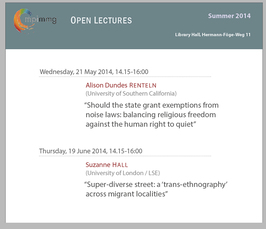"Should the State Grant Exemptions from Noise Laws: Balancing Religious Freedom against the Human Right to Quiet"
Open Lectures Summer 2014
- Datum: 21.05.2014
- Uhrzeit: 14:15 - 16:00
- Vortragende: Alison Dundes Renteln (University of Southern California)
- Alison Dundes Renteln is Professor of Political Science at the University of Southern California where she teaches Law and Public Policy with an emphasis on international law and human rights. She holds joint appointments in Anthropology, the Price School of Public Policy, and the Gould School of Law. A graduate of Harvard (History and Literature), she has a Ph.D. in Jurisprudence and Social Policy from the University of California, Berkeley and a J.D. from the USC Gould School of Law. She has served as Director of the Jesse Unruh Institute of Politics, Vice-Chair, and Chair of the Department of Political Science. In 2005 she received the USC Associates Award for Excellence in Teaching (campus-wide). In Fall 2013 was a fellow at the Center for Advanced Study in the Behavioral Sciences at Stanford University where she conducted research on incentives for civic engagement including the legal duty to rescue. In Spring 2014 she will be a Human Rights Fellow at the School of Advanced Study at the University of London.
- Ort: MPI-MMG, Hermann-Föge-Weg 11, Göttingen
- Raum: Library Hall

For more details please contact buethe(at)mmg.mpg.de.
Even in democratic political systems, religious minorities may experience difficulties when attempting to follow their traditions. In recent controversies involving loud religious sounds, the specific question arises as to whether the Islamic call to prayer deserves an exemption from noise ordinances. This matter has become increasingly fraught with conflict because of the rise of amplification since the 1950s. While regulating excessive levels of noise is ostensibly a legitimate governmental objective, environmental policies may at times be enforced in ways that appear discriminatory. For instance, sounds like the bells from church steeples, although frequent and loud, tend to fade into the soundscape, while new, unfamiliar sounds are considered a nuisance. This analysis considers how best to balance religious freedom against the human right to quiet.